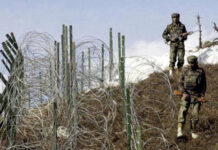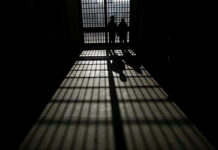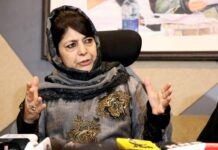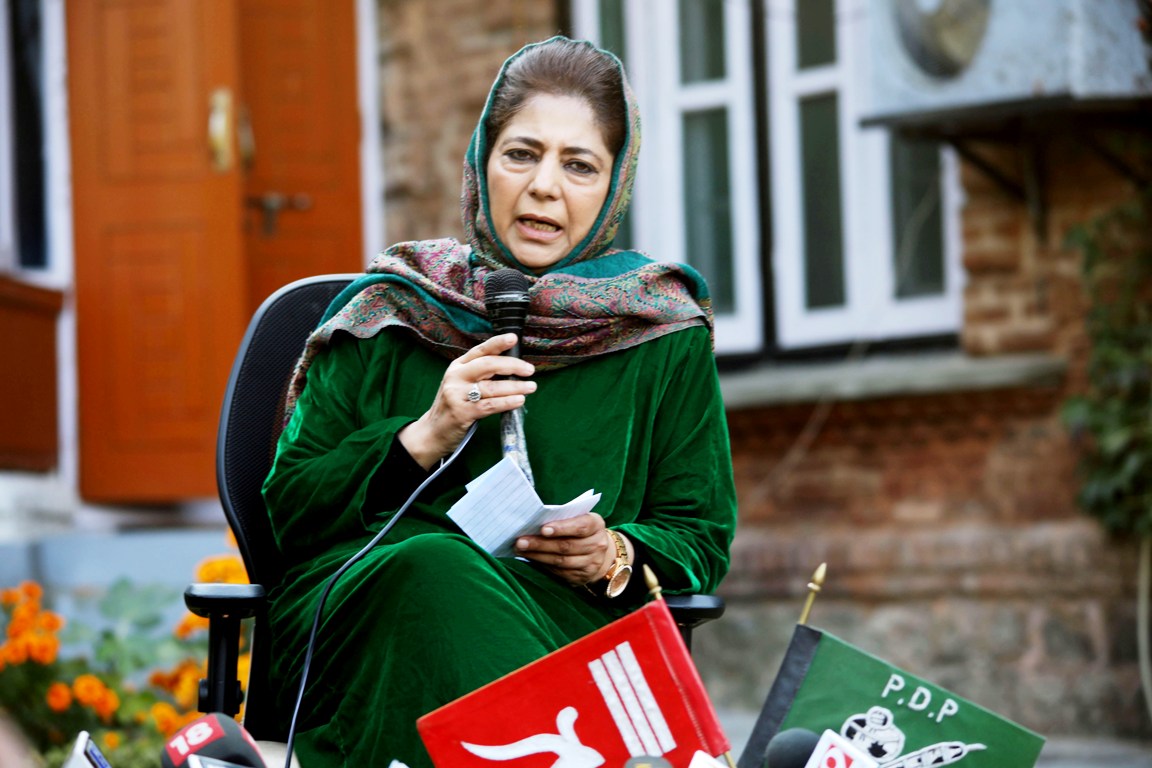
KL News
Srinagar
Former broadcaster Ghulam Nabi Rattanpuri who is NC MP (Rajya Sabha) protested on Thursday in the central hall of the parliament by carrying a placard while the President was delivering his speech to joint session of the parliament. He also released a long letter that he has written to the Prime Minister Dr Manmohan Singh.
He interrupted the President’s address twice to raise the Afzal Guru issue and the discriminatory and differential treatment of Kashmiris in the country. As soon the president stood upto address the joint session of Parliament Ratanpuri also stood up with placards in both hands demanding return of the bodies of Maqbool Batt and Afzal guru to Kashmir.
His voice was not heard in the din created by members of Tamil Parties on the death of LTTE terrorist Prabhakaran’s son in Sri Lanka. Ratanpuri was on his feat again when the President was narrating the plans for preservation of water resources. He shouted that Kashmir is treated differentially in all the matters its water resources are bartered, plundered and contaminated. It is denied democracy, equality, justice and even mercy.
Later he delivered a detailed letter to the Prime Minister raising the same demand and many other matters.
Here follow the contents of the letter:
Respected Prime Minister,
I have been waiting to meet the Hon’ble Home Minister ever since Muhammad Afzal Guru was hanged, but my formal request for an appointment submitted to his personal staff has failed to evoke any response till date. I intended to meet him on the first available opportunity and express our deep anguish and pain on the handling of Afzal Guru case and the manner in which he was hanged.
Since this opportunity was not provided, I am taking recourse to solicit your attention when the Hon’ble President arrives to address the joint session of the Parliament.
The majority of people in Jammu & Kashmir and many jurists, lawyers, human rights activists and ordinary citizens from rest of the country have been agitating for the last 11 years, as they believe that Afzal Guru did not get a fair trial. It has been pointed out that Amicus Curie was reluctant to plead his case and took the job only in compliance of the court order. It has also been pointed out that no proper cross examination of the witnesses took place and the judgment is based on circumstantial evidence only. Many in the country and majority in Jammu & Kashmir perceive that Afzal Guru was condemned by the Media and while extremist elements bayed for his blood, he was hanged to appease public opinion in India in a bid to neutralise ‘Moditva’.
Thus two days before the 29th death anniversary of Maqbool Bhat another Kashmiri was hanged and buried in Tihar jail in a hush-hush manner, not as a conclusion of a fair judicial process, but as a political expediency. Not only the people of Jammu & Kashmir, but many eminent personalities in rest of the world believe that Afzal Guru was used as a scapegoat or in the words of Arundati Roy “as easy meat like most surrendered militants.” To live up to the reputation of being world’s largest democracy, the Govt of India had to ensure a transparent, fair and flawless trial of Afzal Guru to meet international humanitarian standards and provisions of International Covenant on Civilian and Political Rights. There is enough evidence to suggest that it did not happen.
More than eleven years after recording the confessional statement of Guru, Shams Tahir Khan has cast doubts on its authenticity and hinted at a frame up.( “I noticed that Afzal would make eye contact with Rajbir in the middle of every answer, as if to check that he wasn’t straying from the script” INDIA TODAY Vol.XXXVIII No.8, dated Feb19-25,2013 page No.34). I wonder how the collective conscience, satisfied today on Afzal’s hanging, will react if he turns out to be not guilty tomorrow.
Govt of India denied Guru and his family the opportunity of judicial review of the mercy petition. The information available to us suggests that Afzal Guru was informed about his hanging just a few hours before his death. The Home Minister claimed that Guru’s family was informed through a speed post letter (someone from the Govt said a registered letter) and that the DGP of Jammu & Kashmir had verified the delivery of that letter to the family. The DGP denied having made any such claim and the Chief Post Master General of Kashmir clarified that the letter was received by the family two days after the execution, while it had been posted at Delhi only a day before it.
We in Jammu & Kashmir perceive it as another instance of differential, callous and insensitive attitude. The killers of Late Rajiv Gandhi,(Murugan, Santhan and Perarivalan) Punjab Chief Minister Beant Singh(Balwant Singh Rajaona), the 1993 Delhi blast convict, Devinderpal Singh Bhullar and many others who were ahead of Guru in the death row, have received a preferential treatment. Some of the Veerappan associates continue to live after their mercy petitions were rejected while Guru died within a week and without a last meeting with the family.
How do you expect us to explain to the youth of Jammu & Kashmir the denial of judicial review of mercy petition and the least humanitarian courtesies to Guru and his family? I, as a citizen of India, feel that with the hanging of Afzal Guru a nation’s head also hangs in shame. I feel sorry for my Chief Minister, who finds no option, but to express his helplessness in securing the basic Human Rights of his people and in asserting his own authority. I feel, if I don’t raise this issue with all the commitment and strength, I can muster, I shall be betraying my people and my Party that has been espousing ‘Autonomy’, ‘Izzat-o-Aabroo’, ‘Khudi aur Khuddari’ for the last eight decades. I think we are denuded. While some may have been draped in the ‘emperors clothing’, most of us know that we don’t have a fig leaf. I fail to understand how the Central Home Minister can take decisions on the matters falling entirely under the jurisdiction of the State government and without having any regard for the opinion of the concerned Chief Minister. Is this the special status, we boast of.
May I quote some relevant excerpts from an article published by “LEGAL INDIA” and written by Aastha Suman, 4th year, WB NUJS, Kolkata.
“I have always found that mercy bears richer fruits than strict justice.”
-Abraham Lincoln, 16th U.S President
Mercy is God’s grace, a gift to the mankind which gives all an equal chance to mend ways and to correct a deviant behaviour……..Without such a power of clemency, to be exercised by some functionary of the government, a country would be most imperfect and deficient in its political morality……This rationale is further enunciated by Justice Holmes of US Supreme Court where he points out that pardon as of today is not an act of grace but is a constitutional scheme which when granted is determination of the ultimate authority that the public welfare will be served by inflicting less than what the judgment fixed……….. The constitution vests in the president and the governors of various states with the power to grant reprieves and pardons through its articles 72 and 161 respectively……..the Presidential power acts as a safety valve in exceptional cases where the legal system fails to deliver a morally or politically unacceptable result and hence secures public welfare……AL RE The Supreme Court observed in 1976 that a President gripped by communal frenzy and directing commutation on religious or community consideration alone, requires to be kept in check. As a remedy, it was thought essential to vest in the courts the power to review such decisions. The politicisation of clemency powers is inevitable. For instance, the case of Murugan, Santhan and Arivu (sentenced to death for their part in the conspiracy to kill former Prime Minister and leader of the Congress Party Rajiv Gandhi) as also Mohammed Afzal Guru (sentenced to death for conspiracy in the attack on the Indian Parliament…….Furthermore, the absence of transparency in the clemency process is a serious concern, especially since the executive may be subject to pressures extraneous to the case. It is often the case that reasons for accepting or rejecting a mercy petition is not given………………….it was stated that in case the executive gives no reasons for a decision the judiciary is at liberty to come to the conclusion that he had no good reason for reaching that conclusion. The same was upheld in Muhammad Sharif v. Federation of Pakistan……and in Vamuzzo v. Union of India…..which shows the importance of disclosing the basis for a decision on pardoning power. The power of judicial review means that arbitrary executive actions can be corrected by an alert Supreme Court…Another reason why the Supreme Court should intervene in the exercise of executive clemency is due to the delay in decision-making on mercy petitions by either the President or Governors. In both K.P. Mohammed v. State of Kerale] and Sher Singh and Ors. v. State of Punjab. CJ Chandrachud led the Supreme Court benches in suggesting that the state accept a self-imposed rule and decide on mercy petitions within three months. In response to delays caused by the executive considering mercy petitions the Court commuted the sentences of the condemned prisoners in both Madhu Mehta v. Union of India and Ors. and Daya Singh v. Union of India and ors as also in Shivaji Jaising Babar v. State of Maharashtra………It can be said that on an average, four to five years are taken for disposal of a mercy petition. Those who have been sentenced for the death penalty have to wait for an agonisingly long time-……..Such delays add immeasurably to the inhumanity of capital punishment……….these parameters for judicial review were reiterated again in Maru Ram v. Union of India and others where the Constitutional Bench further asserted that the Courts would intervene in cases where political vendetta or party favouritism was evident or where capricious and irrelevant criteria like religion, caste and race had affected the decision-making process. Such malafide and extraneous factors vitiate the exercise of pardon power and should be checked through judiciary…In the matter of Keher Singh, after the president declined to go into the merits of the case decided by the Supreme Court which was supposedly erroneous and also did not permit an oral presentation of cases before it. The court held that the area of the President’s power under Article 72 falls squarely within the judicial domain and can be examined by the court by way of judicial review……….
Thus in light of the above references on capital punishment and pardon and the opinion of noted jurists of the country, Guru didn’t get a fair and equal treatment. A flawed trail, a judicial process aborted, almost a life term before gallows and prison even after death. It is evident now, as it has been earlier on many occasions that India is deficient in political morality when it comes to Kashmir.
I was questioned by a young boy that why the largest democracy of the world cannot afford a heart big enough to accommodate a farewell meeting between a dying man and his family, particularly his young son.
We can’t ignore the fact that given a chance, the majority in Kashmir will opt for Azaadi. A minority believes that our future may be safer in a secular democratic India. This minority strives to motivate the rest of the compatriots to join them in securing our Azaadi within the framework of the Constitution of India. I, as a part of this minority, labour to convince the alienated population of Kashmir, particularly the younger generation, that we can secure our rights in democratic India, which offers plenty of opportunities to all. We candidly accept that a minority community, religious or ethnic, faces a bias or prejudice or discrimination here and there, which, we believe can be neutralised with a bit of extra effort. The disadvantaged sections of the society have to work a little harder and be a little more meritorious than the privileged.
At a time when optimism prevailed in Jammu & Kashmir about a new beginning in relations with the centre, discrimination in the matter of life and death and the denial of basic human courtesies to a bereaved Kashmiri family has given rise to mistrust and added to the sense of victimhood. We live in such a condemned part of country where a Parveen Togadia can come, make hate speeches, stoke communal fires resulting in riots and loss of life and property and leave with a sense of conquest, but where naive boys and girls land in jails for innocuous Face book posts and minors get killed and detained on the charges of sedition for throwing stones.
Are you worried that a onetime worthy colleague of yours and a former Home Minister chose to call the nation of Gandhi a Banana Republic? Are you worried that many people in Jammu & Kashmir believe that their Legislators and Ministers are elected not by their vote, but selected by some organs of the central government .Are you worried that no proper efforts are made to dispel the notion that J & K police takes orders from Delhi and not Srinagar or Jammu, that after the summer unrest of 2010 central Home Ministry takes the briefing of J & K Police officers directly almost on daily basis. Doesn’t the “Atoot Ang” deserve an assurance that the opinion of some intelligence gatherer or ‘strategic asset’ is not more important than the collective sentiment of the majority of the people of J & K, for the decision makers in Delhi.
There are people in Kashmir who believe that with all wisdom, intelligence and intelligentsia at your command and service, you are fully aware of the short term and the long term fallout of the deviation from normal procedure in hanging of Afzal Guru, but crucial decisions in Delhi are influenced, more often than not, by our own supremacist power-mongers. These are the people who believe not in reconciliation, but beating, berating and dehumanising the Kashmiris into submission. They are always in search of agents and lackeys only, as they never expect to find a nationalist in Kashmir.
People in Kashmir believe that Govt of India also chose to ignore the short term and long term ramifications of this decision in the haste to satisfy the blood lust of the extremist sections of public opinion and jumped the death row. Just because
J&K is a small state, just because majority extremism is taken as nationalism, just because elections are to be won and just because votes matter, so the lives of Kashmiris are of no consequence. But this gamble may not bring the desired returns. Mimicking Gujarat Chief Minister may not divert his constituency towards the Congress, but it may make the loyal supporters of Congress party desperate enough to seek refuge under the tutelage of the one they despised most, the original “Hindu Hriday Samrat.” Municipal elections in Salaya may already have set the trend.
Muslims in India are asked by communal forces to “behave like minorities.” In Gujarat they may be already behaving like a minority and accepting their “less than second class citizen” status as their destiny. If Congress chooses to outsmart Modis, Singhals and Tagodias, Muslims in rest of the country may also follow the Gujarat example, but how can they “behave like a minority” at a place where they are in absolute majority.
After the hanging of Afzal Guru a fresh cycle of death and destruction started, leaving three young boys dead and scores injured .Thankfully the situation is returning to normal faster than expected, but we know that the sense of discrimination, depravity and injustice will prevail.
The fact that Govt of India chose to bury Afzal Guru in Tihar jail at a time when an agitation for transfer of the mortal remains of Maqbool Bhat was intensified in J& K, has added insult to the injury. If Govt of Jammu & Kashmir has no problem in receiving the body of Afzal Guru and has recommended his burial according to the wishes of his family, why should Govt of India deny them this “generosity” too. A last glance at the dead body of their dear one and a burial at the native place may act as a small gesture and healing touch to the family and may also assuage the feelings of the agitating public at large.
If we want to arrest the alienation of Kashmiris, if we desire peace in J & K, if we believe that Kashmir is a part of democratic India and life in Kashmir is as precious as in Delhi, you may kindly facilitate transfer of Afzal Guru’s body to his native place at the earliest.
With
Yours sincerely,
(G. N. RATANPURI)















